Analyzing Gender and Social Class in Education: An Overview
VerifiedAdded on 2020/06/06
|8
|2006
|123
Report
AI Summary
This report delves into the multifaceted impact of gender and social class on education, examining how these factors influence learning environments and outcomes. It explores the importance of equal treatment and the need for customized teaching strategies to address gender-related issues. The report also analyzes the Marxist and functionalist perspectives on education, highlighting their strengths and weaknesses in shaping educational systems. Furthermore, it discusses the use of IQ tests in school admissions, addressing the challenges and concerns associated with relying solely on these tests to determine a child's placement, with a focus on the Weald of Kent grammar school. The report emphasizes the need for a holistic approach that considers individual differences and promotes an inclusive learning environment. It also references various academic sources to support the arguments presented.
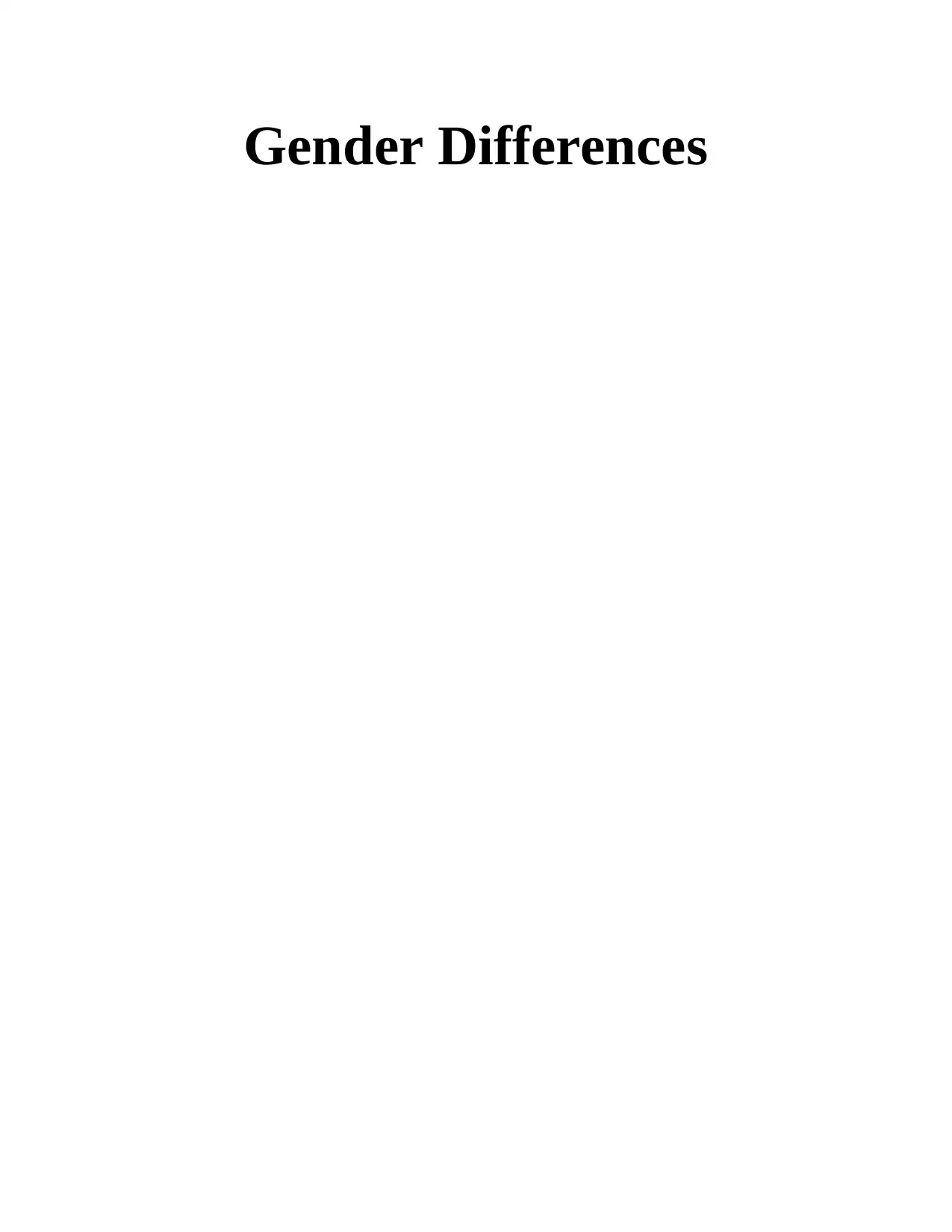
Gender Differences
Paraphrase This Document
Need a fresh take? Get an instant paraphrase of this document with our AI Paraphraser
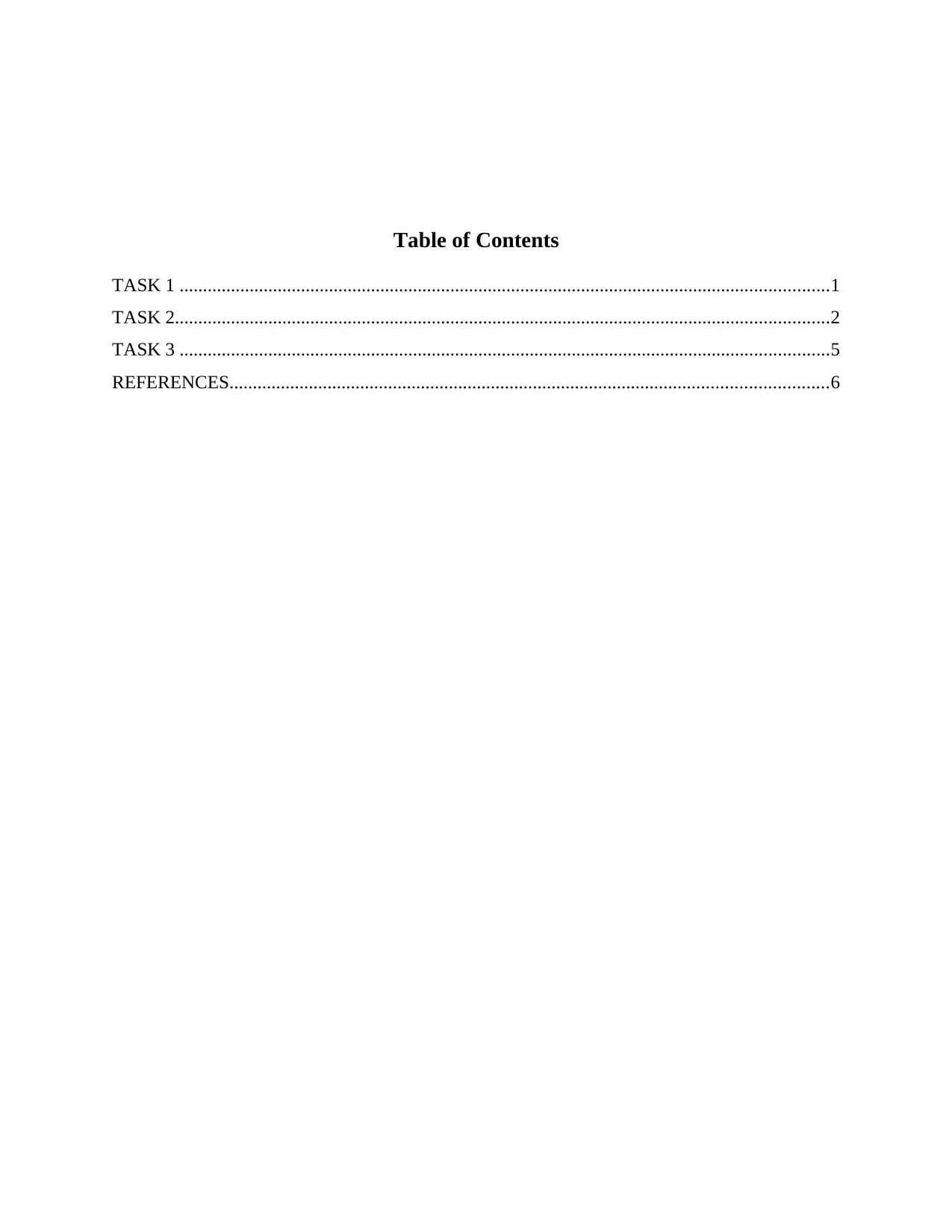
Table of Contents
TASK 1 ...........................................................................................................................................1
TASK 2............................................................................................................................................2
TASK 3 ...........................................................................................................................................5
REFERENCES................................................................................................................................6
TASK 1 ...........................................................................................................................................1
TASK 2............................................................................................................................................2
TASK 3 ...........................................................................................................................................5
REFERENCES................................................................................................................................6
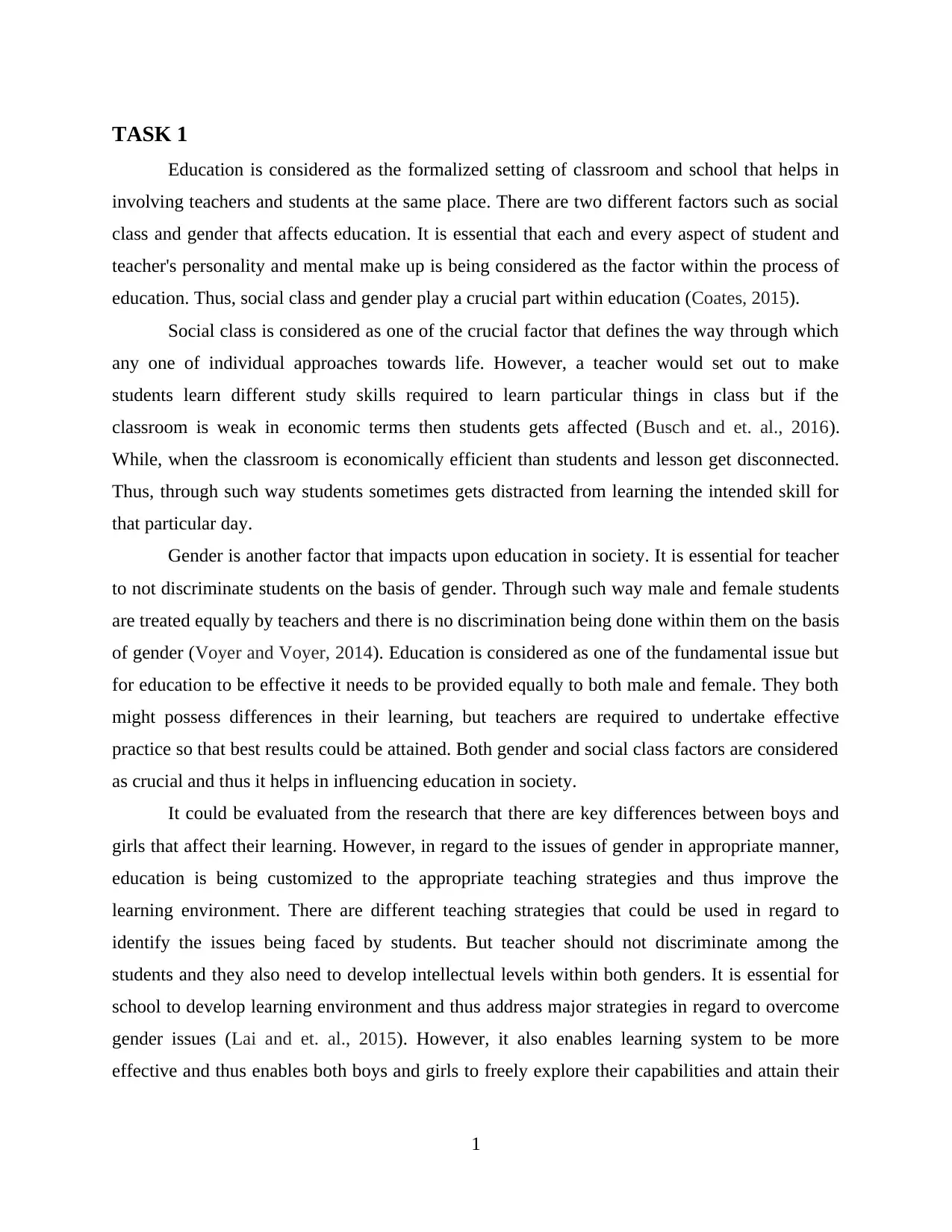
TASK 1
Education is considered as the formalized setting of classroom and school that helps in
involving teachers and students at the same place. There are two different factors such as social
class and gender that affects education. It is essential that each and every aspect of student and
teacher's personality and mental make up is being considered as the factor within the process of
education. Thus, social class and gender play a crucial part within education (Coates, 2015).
Social class is considered as one of the crucial factor that defines the way through which
any one of individual approaches towards life. However, a teacher would set out to make
students learn different study skills required to learn particular things in class but if the
classroom is weak in economic terms then students gets affected (Busch and et. al., 2016).
While, when the classroom is economically efficient than students and lesson get disconnected.
Thus, through such way students sometimes gets distracted from learning the intended skill for
that particular day.
Gender is another factor that impacts upon education in society. It is essential for teacher
to not discriminate students on the basis of gender. Through such way male and female students
are treated equally by teachers and there is no discrimination being done within them on the basis
of gender (Voyer and Voyer, 2014). Education is considered as one of the fundamental issue but
for education to be effective it needs to be provided equally to both male and female. They both
might possess differences in their learning, but teachers are required to undertake effective
practice so that best results could be attained. Both gender and social class factors are considered
as crucial and thus it helps in influencing education in society.
It could be evaluated from the research that there are key differences between boys and
girls that affect their learning. However, in regard to the issues of gender in appropriate manner,
education is being customized to the appropriate teaching strategies and thus improve the
learning environment. There are different teaching strategies that could be used in regard to
identify the issues being faced by students. But teacher should not discriminate among the
students and they also need to develop intellectual levels within both genders. It is essential for
school to develop learning environment and thus address major strategies in regard to overcome
gender issues (Lai and et. al., 2015). However, it also enables learning system to be more
effective and thus enables both boys and girls to freely explore their capabilities and attain their
1
Education is considered as the formalized setting of classroom and school that helps in
involving teachers and students at the same place. There are two different factors such as social
class and gender that affects education. It is essential that each and every aspect of student and
teacher's personality and mental make up is being considered as the factor within the process of
education. Thus, social class and gender play a crucial part within education (Coates, 2015).
Social class is considered as one of the crucial factor that defines the way through which
any one of individual approaches towards life. However, a teacher would set out to make
students learn different study skills required to learn particular things in class but if the
classroom is weak in economic terms then students gets affected (Busch and et. al., 2016).
While, when the classroom is economically efficient than students and lesson get disconnected.
Thus, through such way students sometimes gets distracted from learning the intended skill for
that particular day.
Gender is another factor that impacts upon education in society. It is essential for teacher
to not discriminate students on the basis of gender. Through such way male and female students
are treated equally by teachers and there is no discrimination being done within them on the basis
of gender (Voyer and Voyer, 2014). Education is considered as one of the fundamental issue but
for education to be effective it needs to be provided equally to both male and female. They both
might possess differences in their learning, but teachers are required to undertake effective
practice so that best results could be attained. Both gender and social class factors are considered
as crucial and thus it helps in influencing education in society.
It could be evaluated from the research that there are key differences between boys and
girls that affect their learning. However, in regard to the issues of gender in appropriate manner,
education is being customized to the appropriate teaching strategies and thus improve the
learning environment. There are different teaching strategies that could be used in regard to
identify the issues being faced by students. But teacher should not discriminate among the
students and they also need to develop intellectual levels within both genders. It is essential for
school to develop learning environment and thus address major strategies in regard to overcome
gender issues (Lai and et. al., 2015). However, it also enables learning system to be more
effective and thus enables both boys and girls to freely explore their capabilities and attain their
1
⊘ This is a preview!⊘
Do you want full access?
Subscribe today to unlock all pages.

Trusted by 1+ million students worldwide
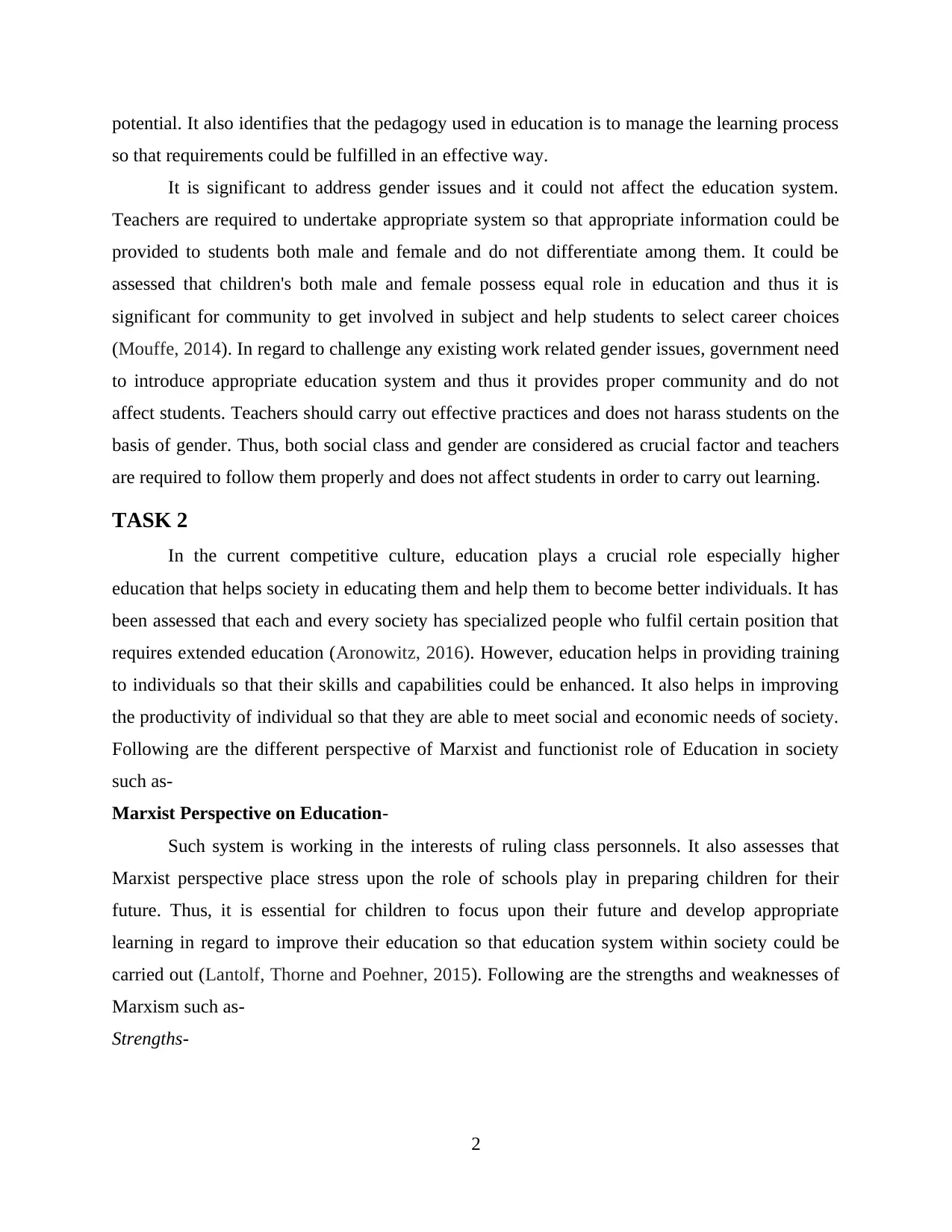
potential. It also identifies that the pedagogy used in education is to manage the learning process
so that requirements could be fulfilled in an effective way.
It is significant to address gender issues and it could not affect the education system.
Teachers are required to undertake appropriate system so that appropriate information could be
provided to students both male and female and do not differentiate among them. It could be
assessed that children's both male and female possess equal role in education and thus it is
significant for community to get involved in subject and help students to select career choices
(Mouffe, 2014). In regard to challenge any existing work related gender issues, government need
to introduce appropriate education system and thus it provides proper community and do not
affect students. Teachers should carry out effective practices and does not harass students on the
basis of gender. Thus, both social class and gender are considered as crucial factor and teachers
are required to follow them properly and does not affect students in order to carry out learning.
TASK 2
In the current competitive culture, education plays a crucial role especially higher
education that helps society in educating them and help them to become better individuals. It has
been assessed that each and every society has specialized people who fulfil certain position that
requires extended education (Aronowitz, 2016). However, education helps in providing training
to individuals so that their skills and capabilities could be enhanced. It also helps in improving
the productivity of individual so that they are able to meet social and economic needs of society.
Following are the different perspective of Marxist and functionist role of Education in society
such as-
Marxist Perspective on Education-
Such system is working in the interests of ruling class personnels. It also assesses that
Marxist perspective place stress upon the role of schools play in preparing children for their
future. Thus, it is essential for children to focus upon their future and develop appropriate
learning in regard to improve their education so that education system within society could be
carried out (Lantolf, Thorne and Poehner, 2015). Following are the strengths and weaknesses of
Marxism such as-
Strengths-
2
so that requirements could be fulfilled in an effective way.
It is significant to address gender issues and it could not affect the education system.
Teachers are required to undertake appropriate system so that appropriate information could be
provided to students both male and female and do not differentiate among them. It could be
assessed that children's both male and female possess equal role in education and thus it is
significant for community to get involved in subject and help students to select career choices
(Mouffe, 2014). In regard to challenge any existing work related gender issues, government need
to introduce appropriate education system and thus it provides proper community and do not
affect students. Teachers should carry out effective practices and does not harass students on the
basis of gender. Thus, both social class and gender are considered as crucial factor and teachers
are required to follow them properly and does not affect students in order to carry out learning.
TASK 2
In the current competitive culture, education plays a crucial role especially higher
education that helps society in educating them and help them to become better individuals. It has
been assessed that each and every society has specialized people who fulfil certain position that
requires extended education (Aronowitz, 2016). However, education helps in providing training
to individuals so that their skills and capabilities could be enhanced. It also helps in improving
the productivity of individual so that they are able to meet social and economic needs of society.
Following are the different perspective of Marxist and functionist role of Education in society
such as-
Marxist Perspective on Education-
Such system is working in the interests of ruling class personnels. It also assesses that
Marxist perspective place stress upon the role of schools play in preparing children for their
future. Thus, it is essential for children to focus upon their future and develop appropriate
learning in regard to improve their education so that education system within society could be
carried out (Lantolf, Thorne and Poehner, 2015). Following are the strengths and weaknesses of
Marxism such as-
Strengths-
2
Paraphrase This Document
Need a fresh take? Get an instant paraphrase of this document with our AI Paraphraser
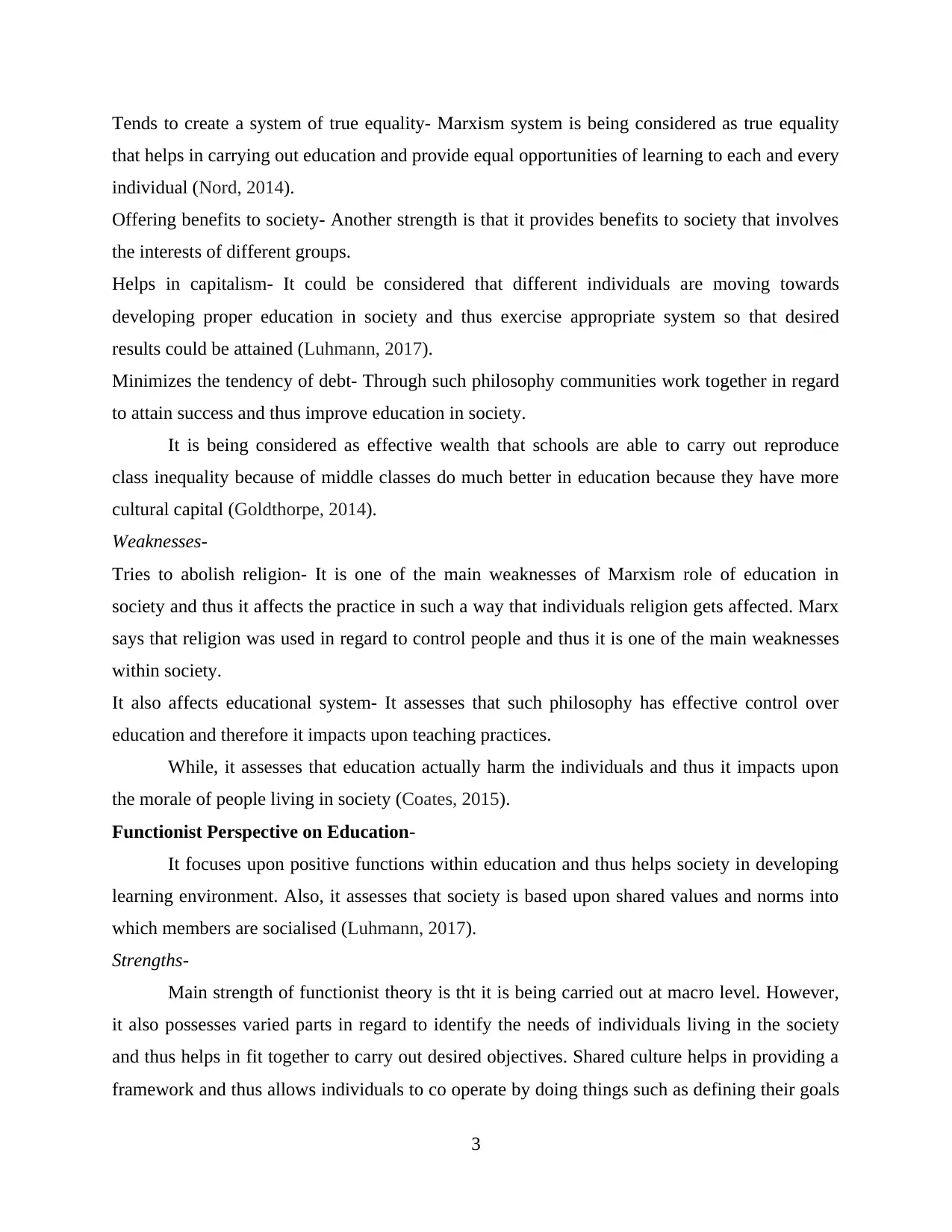
Tends to create a system of true equality- Marxism system is being considered as true equality
that helps in carrying out education and provide equal opportunities of learning to each and every
individual (Nord, 2014).
Offering benefits to society- Another strength is that it provides benefits to society that involves
the interests of different groups.
Helps in capitalism- It could be considered that different individuals are moving towards
developing proper education in society and thus exercise appropriate system so that desired
results could be attained (Luhmann, 2017).
Minimizes the tendency of debt- Through such philosophy communities work together in regard
to attain success and thus improve education in society.
It is being considered as effective wealth that schools are able to carry out reproduce
class inequality because of middle classes do much better in education because they have more
cultural capital (Goldthorpe, 2014).
Weaknesses-
Tries to abolish religion- It is one of the main weaknesses of Marxism role of education in
society and thus it affects the practice in such a way that individuals religion gets affected. Marx
says that religion was used in regard to control people and thus it is one of the main weaknesses
within society.
It also affects educational system- It assesses that such philosophy has effective control over
education and therefore it impacts upon teaching practices.
While, it assesses that education actually harm the individuals and thus it impacts upon
the morale of people living in society (Coates, 2015).
Functionist Perspective on Education-
It focuses upon positive functions within education and thus helps society in developing
learning environment. Also, it assesses that society is based upon shared values and norms into
which members are socialised (Luhmann, 2017).
Strengths-
Main strength of functionist theory is tht it is being carried out at macro level. However,
it also possesses varied parts in regard to identify the needs of individuals living in the society
and thus helps in fit together to carry out desired objectives. Shared culture helps in providing a
framework and thus allows individuals to co operate by doing things such as defining their goals
3
that helps in carrying out education and provide equal opportunities of learning to each and every
individual (Nord, 2014).
Offering benefits to society- Another strength is that it provides benefits to society that involves
the interests of different groups.
Helps in capitalism- It could be considered that different individuals are moving towards
developing proper education in society and thus exercise appropriate system so that desired
results could be attained (Luhmann, 2017).
Minimizes the tendency of debt- Through such philosophy communities work together in regard
to attain success and thus improve education in society.
It is being considered as effective wealth that schools are able to carry out reproduce
class inequality because of middle classes do much better in education because they have more
cultural capital (Goldthorpe, 2014).
Weaknesses-
Tries to abolish religion- It is one of the main weaknesses of Marxism role of education in
society and thus it affects the practice in such a way that individuals religion gets affected. Marx
says that religion was used in regard to control people and thus it is one of the main weaknesses
within society.
It also affects educational system- It assesses that such philosophy has effective control over
education and therefore it impacts upon teaching practices.
While, it assesses that education actually harm the individuals and thus it impacts upon
the morale of people living in society (Coates, 2015).
Functionist Perspective on Education-
It focuses upon positive functions within education and thus helps society in developing
learning environment. Also, it assesses that society is based upon shared values and norms into
which members are socialised (Luhmann, 2017).
Strengths-
Main strength of functionist theory is tht it is being carried out at macro level. However,
it also possesses varied parts in regard to identify the needs of individuals living in the society
and thus helps in fit together to carry out desired objectives. Shared culture helps in providing a
framework and thus allows individuals to co operate by doing things such as defining their goals
3
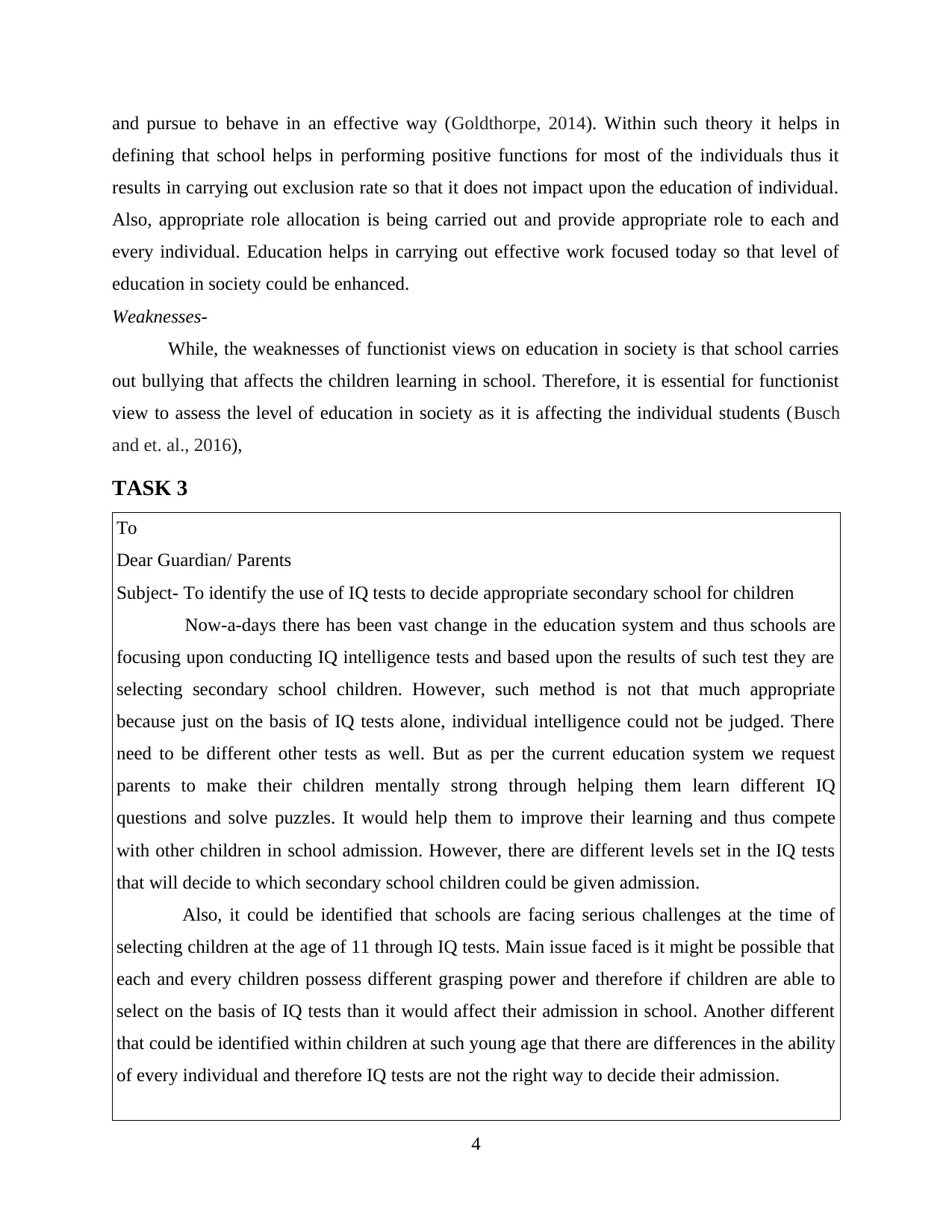
and pursue to behave in an effective way (Goldthorpe, 2014). Within such theory it helps in
defining that school helps in performing positive functions for most of the individuals thus it
results in carrying out exclusion rate so that it does not impact upon the education of individual.
Also, appropriate role allocation is being carried out and provide appropriate role to each and
every individual. Education helps in carrying out effective work focused today so that level of
education in society could be enhanced.
Weaknesses-
While, the weaknesses of functionist views on education in society is that school carries
out bullying that affects the children learning in school. Therefore, it is essential for functionist
view to assess the level of education in society as it is affecting the individual students (Busch
and et. al., 2016),
TASK 3
To
Dear Guardian/ Parents
Subject- To identify the use of IQ tests to decide appropriate secondary school for children
Now-a-days there has been vast change in the education system and thus schools are
focusing upon conducting IQ intelligence tests and based upon the results of such test they are
selecting secondary school children. However, such method is not that much appropriate
because just on the basis of IQ tests alone, individual intelligence could not be judged. There
need to be different other tests as well. But as per the current education system we request
parents to make their children mentally strong through helping them learn different IQ
questions and solve puzzles. It would help them to improve their learning and thus compete
with other children in school admission. However, there are different levels set in the IQ tests
that will decide to which secondary school children could be given admission.
Also, it could be identified that schools are facing serious challenges at the time of
selecting children at the age of 11 through IQ tests. Main issue faced is it might be possible that
each and every children possess different grasping power and therefore if children are able to
select on the basis of IQ tests than it would affect their admission in school. Another different
that could be identified within children at such young age that there are differences in the ability
of every individual and therefore IQ tests are not the right way to decide their admission.
4
defining that school helps in performing positive functions for most of the individuals thus it
results in carrying out exclusion rate so that it does not impact upon the education of individual.
Also, appropriate role allocation is being carried out and provide appropriate role to each and
every individual. Education helps in carrying out effective work focused today so that level of
education in society could be enhanced.
Weaknesses-
While, the weaknesses of functionist views on education in society is that school carries
out bullying that affects the children learning in school. Therefore, it is essential for functionist
view to assess the level of education in society as it is affecting the individual students (Busch
and et. al., 2016),
TASK 3
To
Dear Guardian/ Parents
Subject- To identify the use of IQ tests to decide appropriate secondary school for children
Now-a-days there has been vast change in the education system and thus schools are
focusing upon conducting IQ intelligence tests and based upon the results of such test they are
selecting secondary school children. However, such method is not that much appropriate
because just on the basis of IQ tests alone, individual intelligence could not be judged. There
need to be different other tests as well. But as per the current education system we request
parents to make their children mentally strong through helping them learn different IQ
questions and solve puzzles. It would help them to improve their learning and thus compete
with other children in school admission. However, there are different levels set in the IQ tests
that will decide to which secondary school children could be given admission.
Also, it could be identified that schools are facing serious challenges at the time of
selecting children at the age of 11 through IQ tests. Main issue faced is it might be possible that
each and every children possess different grasping power and therefore if children are able to
select on the basis of IQ tests than it would affect their admission in school. Another different
that could be identified within children at such young age that there are differences in the ability
of every individual and therefore IQ tests are not the right way to decide their admission.
4
⊘ This is a preview!⊘
Do you want full access?
Subscribe today to unlock all pages.

Trusted by 1+ million students worldwide
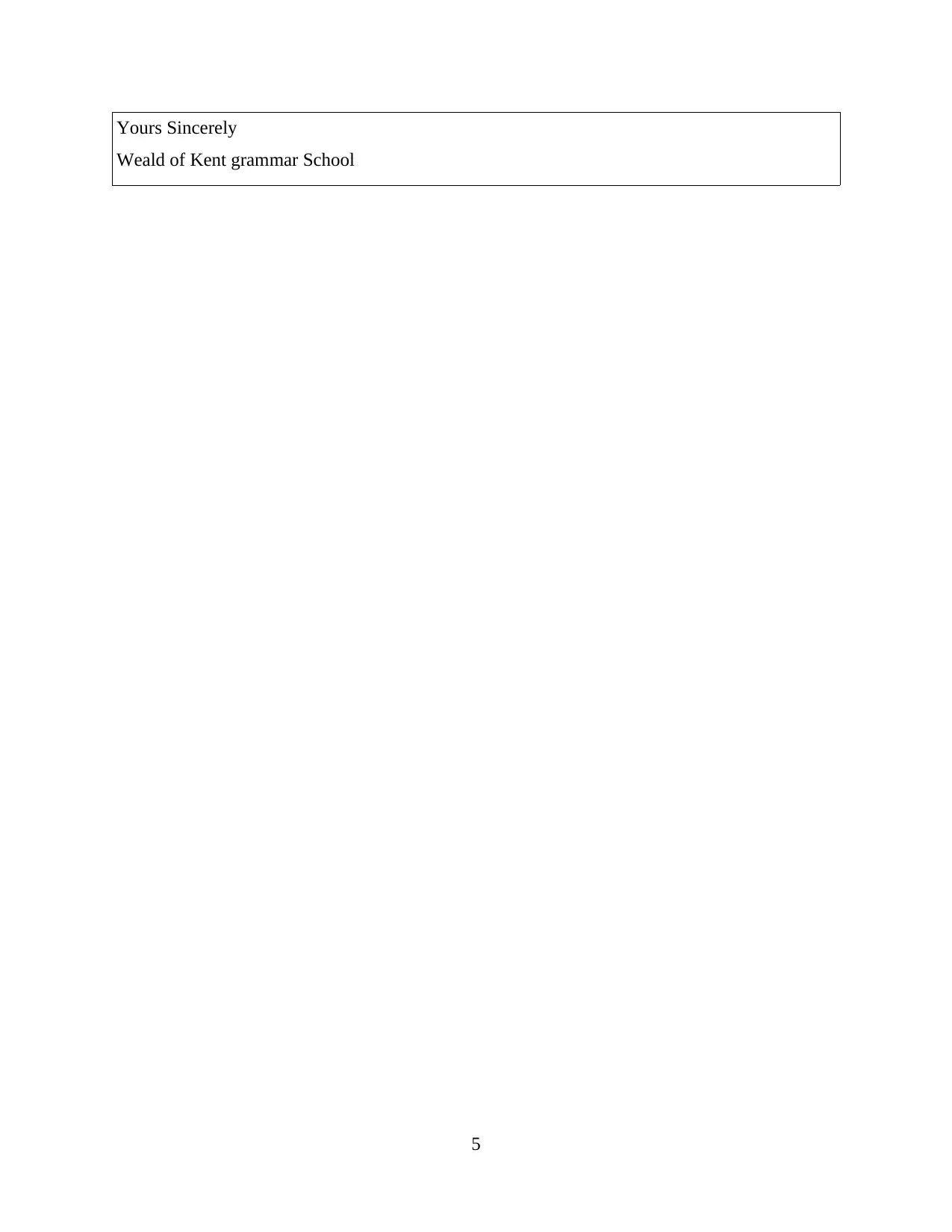
Yours Sincerely
Weald of Kent grammar School
5
Weald of Kent grammar School
5
Paraphrase This Document
Need a fresh take? Get an instant paraphrase of this document with our AI Paraphraser
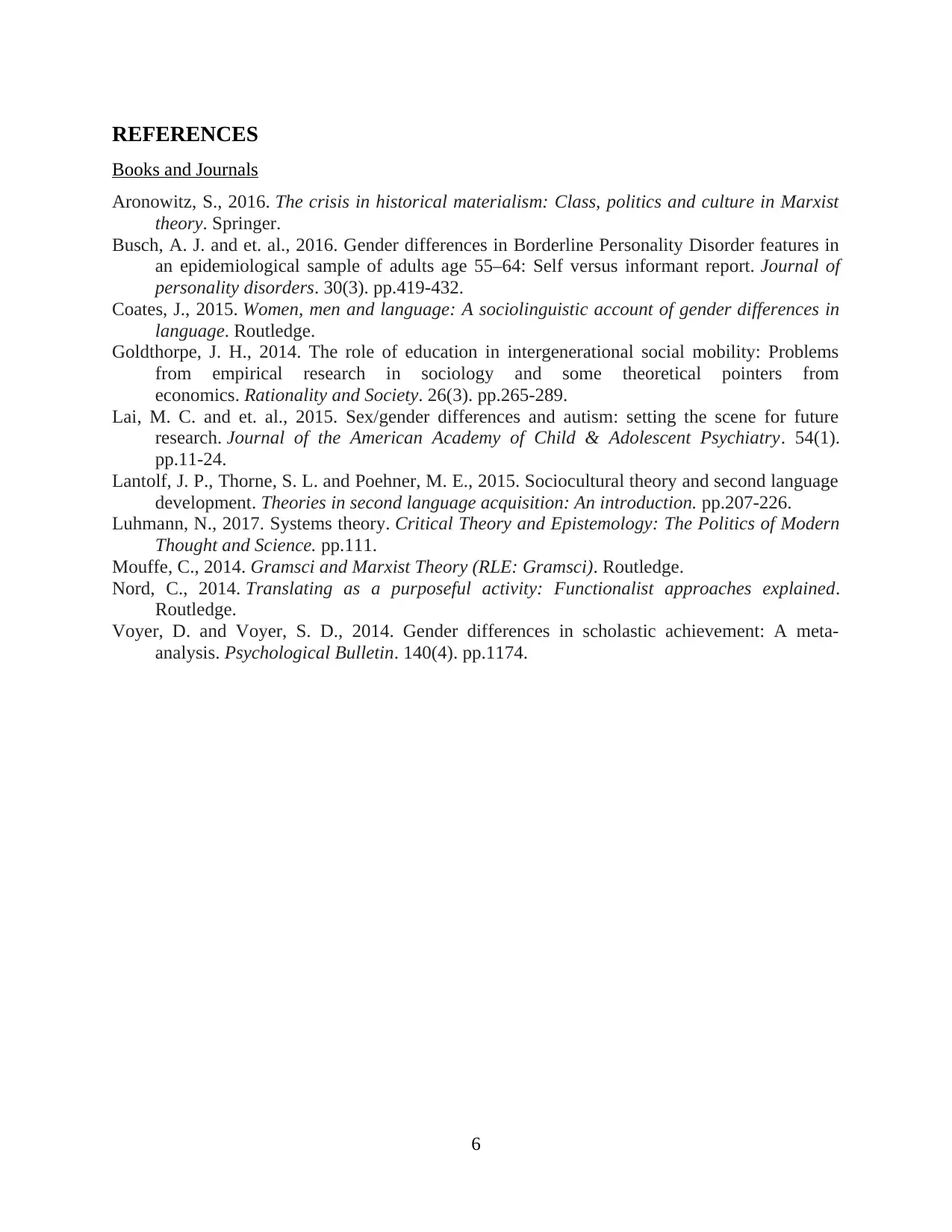
REFERENCES
Books and Journals
Aronowitz, S., 2016. The crisis in historical materialism: Class, politics and culture in Marxist
theory. Springer.
Busch, A. J. and et. al., 2016. Gender differences in Borderline Personality Disorder features in
an epidemiological sample of adults age 55–64: Self versus informant report. Journal of
personality disorders. 30(3). pp.419-432.
Coates, J., 2015. Women, men and language: A sociolinguistic account of gender differences in
language. Routledge.
Goldthorpe, J. H., 2014. The role of education in intergenerational social mobility: Problems
from empirical research in sociology and some theoretical pointers from
economics. Rationality and Society. 26(3). pp.265-289.
Lai, M. C. and et. al., 2015. Sex/gender differences and autism: setting the scene for future
research. Journal of the American Academy of Child & Adolescent Psychiatry. 54(1).
pp.11-24.
Lantolf, J. P., Thorne, S. L. and Poehner, M. E., 2015. Sociocultural theory and second language
development. Theories in second language acquisition: An introduction. pp.207-226.
Luhmann, N., 2017. Systems theory. Critical Theory and Epistemology: The Politics of Modern
Thought and Science. pp.111.
Mouffe, C., 2014. Gramsci and Marxist Theory (RLE: Gramsci). Routledge.
Nord, C., 2014. Translating as a purposeful activity: Functionalist approaches explained.
Routledge.
Voyer, D. and Voyer, S. D., 2014. Gender differences in scholastic achievement: A meta-
analysis. Psychological Bulletin. 140(4). pp.1174.
6
Books and Journals
Aronowitz, S., 2016. The crisis in historical materialism: Class, politics and culture in Marxist
theory. Springer.
Busch, A. J. and et. al., 2016. Gender differences in Borderline Personality Disorder features in
an epidemiological sample of adults age 55–64: Self versus informant report. Journal of
personality disorders. 30(3). pp.419-432.
Coates, J., 2015. Women, men and language: A sociolinguistic account of gender differences in
language. Routledge.
Goldthorpe, J. H., 2014. The role of education in intergenerational social mobility: Problems
from empirical research in sociology and some theoretical pointers from
economics. Rationality and Society. 26(3). pp.265-289.
Lai, M. C. and et. al., 2015. Sex/gender differences and autism: setting the scene for future
research. Journal of the American Academy of Child & Adolescent Psychiatry. 54(1).
pp.11-24.
Lantolf, J. P., Thorne, S. L. and Poehner, M. E., 2015. Sociocultural theory and second language
development. Theories in second language acquisition: An introduction. pp.207-226.
Luhmann, N., 2017. Systems theory. Critical Theory and Epistemology: The Politics of Modern
Thought and Science. pp.111.
Mouffe, C., 2014. Gramsci and Marxist Theory (RLE: Gramsci). Routledge.
Nord, C., 2014. Translating as a purposeful activity: Functionalist approaches explained.
Routledge.
Voyer, D. and Voyer, S. D., 2014. Gender differences in scholastic achievement: A meta-
analysis. Psychological Bulletin. 140(4). pp.1174.
6
1 out of 8
Related Documents
Your All-in-One AI-Powered Toolkit for Academic Success.
+13062052269
info@desklib.com
Available 24*7 on WhatsApp / Email
![[object Object]](/_next/static/media/star-bottom.7253800d.svg)
Unlock your academic potential
Copyright © 2020–2025 A2Z Services. All Rights Reserved. Developed and managed by ZUCOL.





